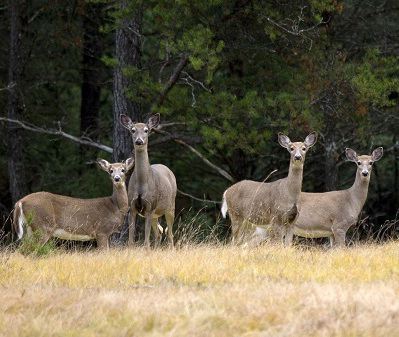Michigan Encourages Hunters in Affected Areas to Have Deer Checked for CWD
DNR encourages hunters in affected areas to have deer checked for chronic wasting disease
CWD suspect positive deer harvested in Dewitt Township; Eaton County hunters urged to voluntarily check deer and cease baiting and feeding of deer
Michigan hunters are proving valuable allies in the fight against chronic wasting disease, a fatal neurological disease that has been found in free-ranging white-tailed deer in the state.
More than 700 hunters have submitted the head of their deer for CWD testing so far this year. Test results help the Michigan Department of Natural Resources determine the extent of the disease, and hunter harvest also helps prevent the spread of CWD by thinning the population in affected areas.
With the firearm deer season starting Sunday, hunters are reminded that they are required to check their harvested deer within a nine-township Core CWD Area consisting of Alaiedon, Delhi, Lansing, Meridian, Wheatfield and Williamstown townships in Ingham County; Bath and DeWitt townships in Clinton County; and Woodhull Township in Shiawassee County.
The DNR strongly encourages hunters in a broader CWD Management Zone – consisting of Clinton, Ingham and Shiawassee counties – to check their deer and have them tested for CWD as well.
“The firearm deer season is our single best opportunity to collect sufficient samples to understand the extent of this invariably fatal disease,” said Chad Stewart, DNR deer specialist.
The DNR has thus far confirmed three cases of CWD-infected deer in free-ranging deer in Michigan, all in Ingham County.
Earlier this week, a hunter from Dewitt Township (Clinton County) in the Core CWD Area brought a 1.5-year-old buck into the DNR’s Rose Lake deer check station. Preliminary tests indicate that this deer may be positive for CWD. A sample has been sent to U.S. Department of Agriculture’s National Veterinary Services Laboratory in Ames, Iowa, for final assessment. The test could take several weeks to complete.
“The hunter was notified of the potentially positive deer and has been extremely cooperative and helpful,” said Dr. Steve Schmitt, DNR wildlife veterinarian. “It really indicates that hunters want to be part of the solution. We commend him for following the law and getting his deer checked. This news could change our assessment on how far-reaching the disease is at this point.”
Because the suspect positive deer was harvested within 10 miles of the Eaton County border, the DNR strongly encourages all hunters within Eaton County to voluntarily stop baiting and feeding, continue hunting, and most importantly bring harvested deer into a DNR check station.
Although the DNR does not usually share suspect positive results, given the large number of hunters about to take to the field on Sunday, the department took this step to encourage hunters to continue hunting and make sure to have their deer checked and tested for CWD. Otherwise, the DNR might miss an excellent opportunity to determine the extent of this disease in Michigan deer.
There will be no mandatory regulation changes from now through the end of the deer season as the DNR conducts CWD surveillance and decides what additional steps might need to be taken for next year’s season.
The DNR reminds individuals hunting outside Michigan in a state or province that has CWD in its free-ranging deer, elk or moose that only the following parts of deer, elk or moose carcasses can be brought into Michigan:
deboned meat
antlers
antlers attached to a skull cap cleaned of all brain and muscle tissue
hides
upper canine teeth
finished taxidermy mount
If a hunter is notified by another state or province that a deer, elk or moose that was brought into Michigan tested positive for CWD, that hunter must contact the DNR Wildlife Disease Lab at 517-336-5030 within two business days (8 a.m. to 5 p.m.).
CWD is a fatal neurological disease that affects white-tailed deer, mule deer, elk and moose. It is caused by the transmission of infectious, self-multiplying proteins (prions) contained in saliva and other body fluids of infected animals. Susceptible animals can acquire CWD by direct exposure to these fluids, or from environments contaminated with these fluids or the carcass of a diseased animal.
Some chronically CWD-infected animals will display abnormal behaviors, progressive weight loss and physical debilitation; however, deer can be infected without showing internal or external symptoms for many years. There is no cure; once a deer is infected with CWD, it will die.
To date, there is no evidence that chronic wasting disease presents any risk to non-cervids, including humans, either through contact with an infected animal or from handling venison. However, as a precaution, the U.S. Centers for Disease Control and the World Health Organization recommend that infected animals not be consumed as food by either humans or domestic animals.
The DNR provides CWD weekly updates online at www.michigan.gov/cwd. Announcements of additional CWD-positive deer will be posted online.




